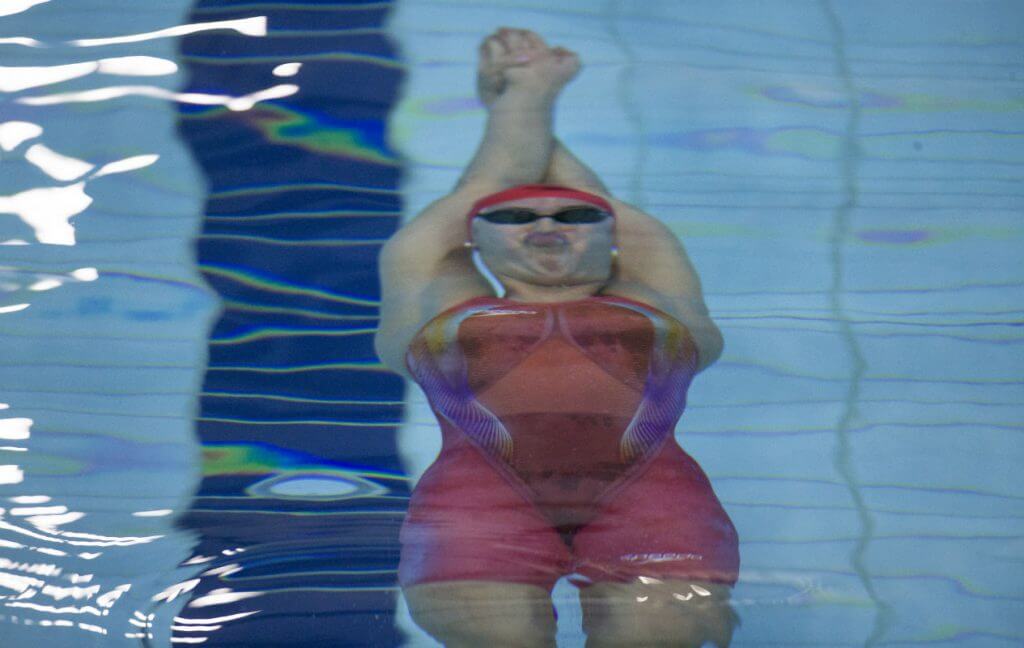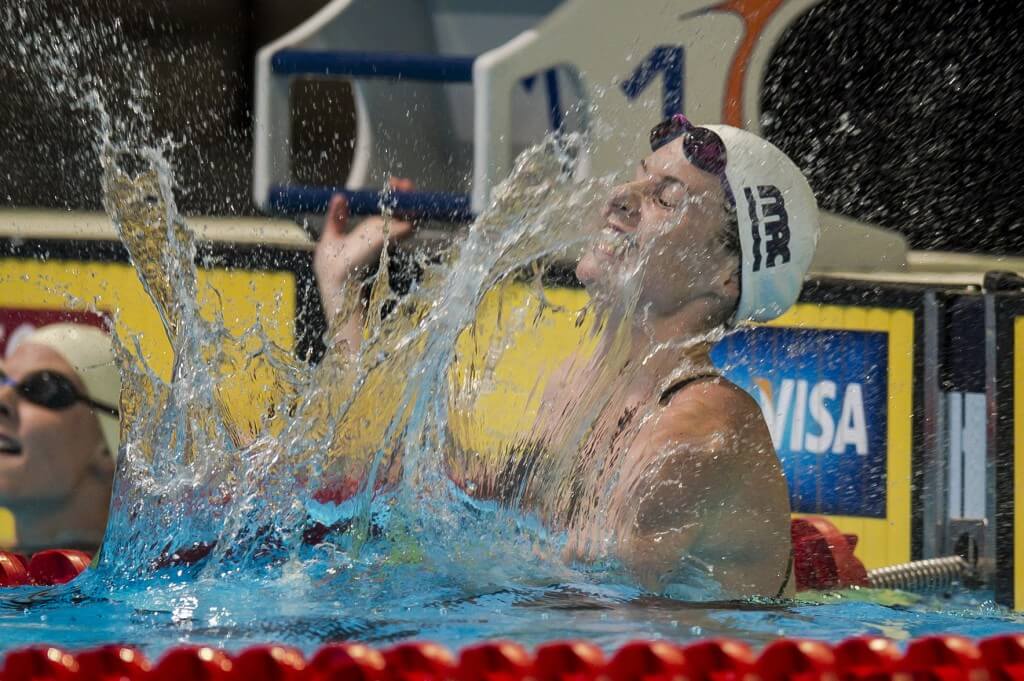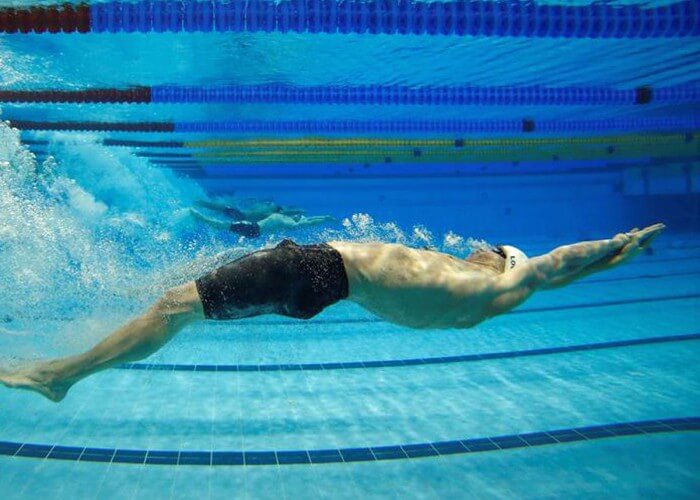9 Strange Skills Every Swimmer Acquires Over Time

9 Strange Skills Every Swimmer Acquires Over Time
The other day I saw a girl in her volleyball uniform and thought, “Huh, I wonder how different life would be if I had picked a different sport.” I’d have different friends, a different husband, different skill sets, a different body, and a different definition of training. Swimming shaped and continues to shape my world, and seldom do I realize the odd bag of tricks swimming has handed me.
Here are a few quirky skills every swimmer will acquire over years of churning chlorinated water.
1. Comfortable with Silence
There were times during high school practice that the synchronized swim team would be practicing, and our club group would get excited. Hooray for underwater music to get us through our treacherous practice! On the tenth repeat of the Lion King theme song, I wanted my serene silence back. I didn’t just have the song stuck in my head, it was actually playing on repeat and the visual of Simba being lifted on Pride Rock was not motivating me. We were relieved when their practice was over and we were left with that blessed silence we never realized we liked.
2. High Wedgie Tolerance
This is truly weird. I guess female gymnasts can share in this, but they typically can adjust their leotards after their brief routine. Distance swimmers will swim a mile and their wedgie will worsen with every flip turn and it’s just perfectly normal. I think many other athletes would stop at every wall to make an adjustment, but swimmers blaze on, too focused to notice or care about any indecent exposure of the behind.
3. Self-Talk Masters
Every psychologist will preach on the power of self-talk. Unlike any land sport, we cannot hear constant critiques from our coaches, as desperately as they try to provide helpful hints on our open turns (From the coach’s “head down” exclamation, swimmers may catch the “owwwn”…not useful, but worth a try, coach). I think I do chat with myself a lot in life from the thousands of hours I spent with my ears in the water. The best swimmers are the most positive thinkers. Otherwise, they would not be able to tolerate hours of their brain’s constant underwater chatter.
4. Underwater Cheering: The Rock Clap
Sometimes, it helps if the silence is interrupted. At the end of a hard set, when your teammate is doing an all-out effort, they want to hear something in the last 15 meters (aside from their oxygen-deprived grunts of pain). If you haven’t learned the art of pounding “the rock” against your palm, it’s high time. It consists of establishing the rock (think Rock, Paper, Scissors) with one fist and hitting the base of your “rock” against your opposite palm underwater. The motivating sound waves from the rock clap will carry your teammate home!
5. Clean Freaks
OK, I realize swimmers sometimes compete to see who can go without showering for the longest duration (guilty!), but there’s no doubt competitive swimmers are clean specimens. Even without the showers, the only filth swimmers feel is the itch of chlorine resting on their skin and in their hair. While most sports absolutely require a shower after practice, swimmers hop out feeling detoxified from a good sweat and squeaky clean. On average, I wonder how much more retired swimmers shower than other people. We all suffer a lifelong addiction to that clean feeling. Not a bad thing!
6. Aquatic Coordination
We spend so much time learning how to properly orchestrate our limbs in the pool, but then our graceful frames move more like Frankenstein on land. Partly because we’re not used to all of that gravity and partly because we just expended all of our mental and physical energy in the pool. It’s true, a coordinated swimmer on land is an anomaly. We have a hyper awareness of our bodies in the water which seems to drip away when we climb out of the pool. This is why we all have dreams of living in an underwater world where we could show all those land animals how graceful and efficient we truly are. But hey, water coordination is a skill most of the world envies.
7. Lung Capacity
We don’t often think about how much of our sport is spent depriving our bodies of oxygen. Most people pant freely throughout their games, we have to wait until the wall to wheeze. Staying underwater for 15 meters off each wall would be madness to the Average Joe. We are cardiovascular animals, sacrificing air for speed. This skill may emerge later in life when some naive non-swimmer challenges you to a breath holding contest. Still got it!
8. Quick Arithmetic
Sometimes I felt fortunate to have that quiet time during sets to add up my times or cramp my brain trying to figure out when I needed to depart for my next effort. When swimmers hear “1:30 base” they’re being asked to do some basic math to get through the set. Our entire sports revolves around numbers, so math person or not, you exit the sport with a little extra numeric knowledge.
9. The Triceps Slap
As a female swimmer, I never had a great desire to do the Tri Slap. But if you’ve ever been on a pool deck with boys old enough to recognize the existence of their own musculature, you’ve heard the Tri Slap. It’s almost a rite of passage on the pool deck for male swimmers. I’ve never seen LeBron James do this…ah, because he wears a shirt. The Tri Slap requires skin-to-skin, abrupt contact between the swimmer’s lat and triceps. Almost like a full-armed snap. Someone needs to get a Tri Slap Band started. Viral YouTube video waiting to happen.
Just a sampling of the odd skills we pick up in this water world. Oh, I missed something? Please share any treasured skills I’ve not given proper credit.






While my friends and I typically referred to the tricep slap as the lat snap, it was amazing how such a simple motion could both get you hyped and intimidate the competition. As I recall, one of my teammates could do it so loud that he could make it echo in our natatorium.
Girl, 1 and 5… all day long. I swam probably 15 years competitively, like most readers, and realized very early on that I had a very low noise tolerance. I’d been better at soccer early on, and caught a bunch of crap for going full-time swimmer, but I needed my quiet time. That, and it was my workout and meditation all in one. When you grow up in Virginia with my name… you really enjoy it when nobody can speak to you. Flash forward 15 years and Nobody can believe I’m not married yet. But I won’t unless I can find someone like the teammate I dated for years. We could cuddle for hours and just be happy with each other. Not a word needed to be said.
And lung capacity? Bahaha. Even recently I was in a charity run and had just finished, and my friends like “Bobbitt man, gasp, pant, BREATH! Do something!”. “Nah, bro, I’m good.” Also good for tripping out the occasional nurse or blood tech at the doctors. They take your pulse, look at their watch, shake their watch. Count again, then Look up…. “swimmer”. Cue the eye roll and they stalk off.
Bahaha. Damn you guys make me miss my team with these articles. ?
Resting pulse rate. That’s a biggie.
I’m 62. I swam in the 70’s to early 80’s. I was in for a regular check up two or three years ago. Doc took my blood pressure. It was well below what was average for someone my age. He did it twice. Then, with a frown, he checked my pulse for a full minute. Then he stood right in front of me, leaned in and almost yelled ‘ it’s 46!!!’ . Made me laugh.
You forgot the hand water squirt. I could even do it with my hands out of the water.
When I teach lessons, kids call me the human squirt gun?
#10. Converting distances in feet into approximate distances in yards (or meters depending on the season)
On the highway, when my phone map tells me the exit is coming up in 700 feet, I divide that by 3 to convert that to “a bit over 200 yards” to get a better sense of when the exit will actually be coming up. When my friend told me she backpacked up a 14,000 foot peak, I mentally converted that to “a bit under 5,000 yards” above sea level, which is like almost three 1650’s!
I normally do a pec slap. Tris might come in every now and then.
lung capacity- I believe it changes your entire being. At almost 80 I have respiratory problem which give me an arterial o2 level of 72, in a good day. Most doc’s amazed that
I am not on oxygen full time. Could it be that my 50+ years of masters swimming has made me more tolerant of my really low O2. I think so> Doug Buchan